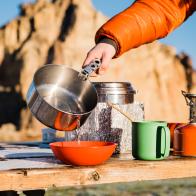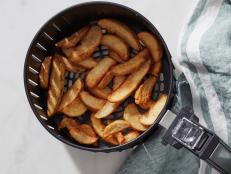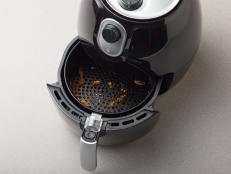How to Safely Shop at Farmers Markets During the Pandemic
Protect yourself, fellow shoppers and farmers at your local market with tips and advice from experts.

zoranm/Getty Images
One of the harbingers of spring and summer is seeing the farmers markets fill up. After months of sparse attendance, warmer weather brings an abundance of foods and flowers, and crowds happily perusing, sampling and buying.
Even though we’re sheltering in place, limiting shopping trips and avoiding crowds, the experience of shopping at farmers’ markets doesn’t have to end. With careful planning, patience and flexibility, you can still enjoy all that fresh-from-the-farm spring produce.

kasto80/Getty Images
First, Choose Your Market Wisely
Look for safety measures. If you have a choice in your area, "attend markets that are implementing good safety procedures such as controlling traffic in and out, enforcing social distancing, and requiring that masks be worn by both vendors and customers," says Brian Coppom, executive director of Boulder County Farmers Markets.
Open-air is better. Even if your market is monitoring traffic in and out, open-air markets are safer than enclosed ones, notes Dr. Theresa Brennan, MD, chief medical officer of the University of Iowa Hospitals & Clinics.
Know the hours. Follow your markets’ social media accounts to keep up with any changes to the markets’ hours, rules, and more, says Liz Carollo, assistant director of GrowNYC’s Food Access and Agriculture Program.

ArtMarie/Getty Images
How to Practice Safe Shopping
Avoid busy times. Showing up at the market first thing in the morning seems like the best way to get the most variety and the smallest crowds — unless everyone has the same idea, Carollo says. "We’re asking people to stagger their visits, and instead of first thing in the morning, try the 10 to 11 a.m. hour," she says, adding that whenever you arrive, if the market is crowded, come back later or another day, rather than adding to the congestion.
Visit alone — and leave your pets at home. Another way to keep crowd size down: Come to the market alone or with just one other person, Carollo says. If you do come with someone else, split up and cover different vendors to minimize your time at the market. Also: "This is a tough one for us, but please don’t bring your dogs to the market," she says. “Anything you can do to reduce congestion helps."
Opt for pre-bagged food. Once you’re in the market, look for vendors offering pre-bagged items, Coppom says. "I like [this option] because I can be confident it was bagged in a controlled environment on the farm." He also recommends seeking out vendors who have hand-washing stations, hand sanitizer or wipes available.
You touch it, you take it. If pre-bagged isn’t an option, touch the food as little as possible, says Dr. Tania Elliott, MD, attending physician at NYU Langone, specializing in infectious disease, allergy and immunology. "If you touch it, take it. Don’t fondle the food, smell it or squeeze it," she says.
Know how to clean the produce you buy. While selecting produce, consider what’s easiest to clean. "Be cognizant of what you buy and how easy it is to make sure that you're getting it clean," Dr. Brennan says.
Bag your own goods. When it’s time to check out, don’t hand your reusable bags to the vendors, Carollo says. Instead, ask the vendor to put the items down and let you bag them, or ask them to drop the items into your bag, to minimize contact.
Avoid all samples. Many markets have stopped the practice of offering samples — but if yours still has them available, avoid them.
And, of course, all the social distancing and safety rules apply: Wash your hands before leaving the house, bring hand sanitizer with you and use it frequently, wear a mask, and stay six feet apart from others.

Mike Harrington/Getty Images
What To Do When You Get Home
Toss non-reusable bags. Take items out of bags you got at the farmers market and discard them. Dr. Brennan says. If you brought your own bags, clean them right away, especially if someone in the market handled them.
Wash up. Before and after you handle bags and produce, wash your hands thoroughly.
Clean the goods. "Produce should be washed, just like we would normally wash it," Dr. Brennan says. Clean and dry it thoroughly before placing it in the fridge or in bowls to store at room temperature.
Remember countertops. To be extra safe, clean and sanitize your countertops before you go to the market, and then do it again after you’ve washed and put away your farmers market produce.

Oscar Wong/Getty Images
Another Option: If You Can, Order Online
Sometimes the best choice is to avoid shopping at the farmers market (especially if you or someone you live with is considered high risk or is immunocompromised) — but that doesn’t mean you can’t get that fresh produce and support the farmers. Many markets are offering online ordering for pickup, which is a great option both for your safety and to minimize exposure for other shoppers and vendors. "I would encourage readers to look in their area to see if their farmers markets are offering online ordering," Dr. Brennan says. "It’s obviously safer because they don't have to interact with people. Some of the farmers markets get pretty busy and the ability to do social distancing can be really challenging."
Order directly from vendors. Even if your market doesn’t offer online ordering, you may be able to get your farm-fresh produce directly from your favorite vendors. "There may be a way for you to continue to support small farms even if you don’t want to visit a farmers market," Carollo says, adding that you can reach out to your local market to see if they can help you order from a favorite vendor. If you know the name of a local farm that you like, you also can reach out to them directly to see if they have a way of getting their products to you.
No matter how you approach farmers’ market shopping right now, keep in mind that it may take longer or feel different from what you’re used to. "Be patient, and be kind," Carollo says. "We’re all in this together.”
Related Links:
































